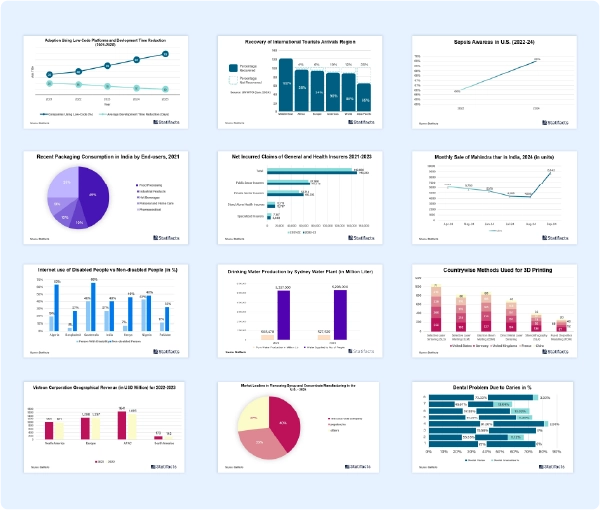The U.S. biosimilar monoclonal antibody market size accounted for USD 3,210 million in 2024 and is expected to exceed around USD 26,500 million by 2034, growing at a CAGR of 23.5% from 2025 to 2034.
U.S. Biosimilar Monoclonal Antibody Market Report Highlights
- By type, the infliximab segment held a dominant presence in the market in 2024.
- By type, the adalimumab segment is expected to grow at the fastest rate in the market during the forecast period of 2025 to 2034.
- By indication, the oncology segment registered its dominance over the market in 2024.
- By indication, the autoimmune diseases segment is predicted to witness significant growth in the market over the forecast period.
- By end-user, the hospital segment led the market.
- By end-user, the others segment will gain a significant share of the market over the studied period of 2025 to 2034.
The global market for biosimilar monoclonal antibodies was valued at $8.7 billion in 2022 and is expected to reach $64.7 billion by 2032, with a compound annual growth rate (CAGR) of 22.2% from 2023 to 2032. These products are similar to existing monoclonal antibodies in structure and function and are used to treat various diseases, including cancer and autoimmune disorders. Biosimilar monoclonal antibodies (mAbs) are biological products designed to closely match already approved reference mAbs. These biosimilars promise no significant differences in safety, purity, or potency compared to their reference counterparts. They provide effective treatments for various health issues, such as cancer, autoimmune diseases, and certain infections, offering a more affordable option than their original, costly counterparts.
Biosimilar mAbs find applications in fields like oncology, rheumatology, and gastroenterology, among others that commonly utilize mAbs. The outlook for biosimilars appears promising, fueled by growing healthcare needs, supportive regulatory environments, and advancements in research and development. As patents for original mAbs reach their expiration, the biosimilar market is expected to expand, thereby enhancing access to crucial medications and contributing to reduced healthcare expenses on a global scale.
The growth of the U.S. biosimilar monoclonal antibody market is driven by several key factors. One significant factor is the rising incidence of breast cancer, which heightens the demand for effective treatments. Additionally, there is an increasing awareness of the importance of early diagnosis, leading to more patients seeking innovative treatment options. Monoclonal antibodies, which are a form of biological therapy, have transformed the landscape of treatment for many diseases, providing improved efficacy and specificity compared to traditional small-molecule drugs.
However, the high costs associated with producing these biologics often result in expensive treatments, making them less accessible for many patients. Biosimilar monoclonal antibodies present a more affordable alternative, aiming to alleviate healthcare costs while ensuring similar therapeutic benefits. As patents for original biologic monoclonal antibodies expire, manufacturers of biosimilars are given the opportunity to introduce their versions into the U.S. biosimilar monoclonal antibody market. This patent expiration fosters competition, allowing healthcare systems to negotiate better prices and give patients access to more budget-friendly treatment options. Furthermore, biosimilar mAbs can be utilized across a wide variety of therapeutic areas, including oncology and autoimmune disorders, enabling manufacturers to address diverse health challenges and further fueling growth in the U.S. biosimilar monoclonal antibody market.
Monoclonal antibody therapy is rapidly becoming a key treatment for chronic diseases, particularly cancer. The popularity of these drugs is increasing, leading to significant sales of products like Herceptin and Humira. This trend has prompted major pharmaceutical companies to invest heavily in monoclonal antibody research. Additionally, government agencies, including the U.S. Department of Health and Human Services (HHS), are providing funding for innovative mAb development. For example, in August 2023, HHS awarded over $1.4 billion for Project NextGen, which focuses on developing monoclonal antibodies and related therapies.
Chronic diseases are a significant global issue, prompting governments to focus on lowering associated costs. In the U.S., nearly 60% of adults have a chronic condition, costing around $3.5 trillion yearly in healthcare. Additionally, addressing patient needs and enhancing health reimbursement for monoclonal antibody treatments is expected to drive growth in the monoclonal antibody therapy market.
AI is driving growth in the U.S. biosimilar monoclonal antibody market by streamlining drug development processes, enhancing predictive analytics for clinical outcomes, and optimizing manufacturing efficiency. It aids in identifying potential biosimilars, reduces time and costs in research and development, and improves targeting of patient populations through data analysis. Additionally, AI facilitates regulatory compliance and market access strategies, ultimately accelerating the introduction of biosimilars into the market.
The U.S. biosimilar monoclonal antibody market is poised for growth, especially in emerging regions like Asia-Pacific and Latin America, driven by rising healthcare spending and chronic disease prevalence. Advancements in biotechnology and increased industry collaboration are facilitating more efficient production of high-quality biosimilars, further enhancing market opportunities.

